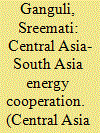|
|
|
Sort Order |
|
|
|
Items / Page
|
|
|
|
|
|
|
| Srl | Item |
| 1 |
ID:
134136


|
|
|
|
|
| Publication |
2014.
|
| Summary/Abstract |
This article focuses on India's energy security demands, as well as the energy security scenario of its immediate neighbors, mainly Pakistan and Afghanistan, and of its strategic neighborhood, i.e. the Central Asian countries. It attempts to concentrate on the factor of energy interdependence among these countries and argues that the possibility of an interregional energy cooperation mechanism is essential for energy security, and ultimately, stability in the wider region. A concept of interregional cooperation based on interdependence is vital for security in the broad sense of the term. These two neighboring regions do enjoy energy interdependence. The wider region has all three ingredients of the energy supply chain-the Central Asian countries as producers, Afghanistan and Pakistan as both transit and market states, and India as the market to make this cooperation feasible. But there has scarcely been any serious effort to put this energy chain into a meaningful dependency variable. For both regions, the other always seems too distant, either as a source or as a market. The continuing insecurity in Afghanistan and bilateral distrust between India and Pakistan are two of the major factors that always put energy relations between Central and South Asia on the backburner. But future prospects may not be so bleak, since the changing security scenario in Afghanistan calls for greater regional economic cooperation, which will be beneficial for Afghan economic reconstruction. More important, it will make the regional states shareholders not only in the Afghan reconstruction process, but also in ensuring greater interregional cooperative mechanisms as well. It is widely believed that energy as a product is a factor of geopolitical and geo-economic conflicts the world over, and there is also plenty of supporting evidence. This article, on the other hand, focuses on the potential of using energy as a vector of alliance in the regional and interregional context.
|
|
|
|
|
|
|
|
|
|
|
|
|
|
|
|
| 2 |
ID:
109908


|
|
|
|
|
| Publication |
2012.
|
| Summary/Abstract |
Using the most comprehensive weekly dataset of 'A' shares listed on the Chinese stock market, this paper examines short-term contrarian strategies under different market states from 1995-2010. We find statistically significant profits from contrarian strategies, especially during the period after 2007, when China (along with other countries) experienced an economic downturn following the worldwide financial crisis. Our empirical evidence suggests that: (1) no significant profit is generated from either momentum or contrarian strategies in the intermediate horizon; (2) after microstructure effects are adjusted for, contrarian strategies with only four to eight weeks holding periods based on the stocks' previous four to eight week's performance generate statistically significant profits of around 0.2% per week; (3) the contrarian strategy following a 'down' market generates higher profit than those following an 'up' market, suggesting that a contrarian strategy could be used as a shelter when the market is in decline. The profits following a 'down' market are robust after risk adjustment.
|
|
|
|
|
|
|
|
|
|
|
|
|
|
|
|
|
|
|
|
|